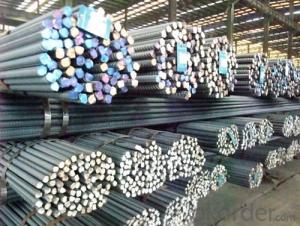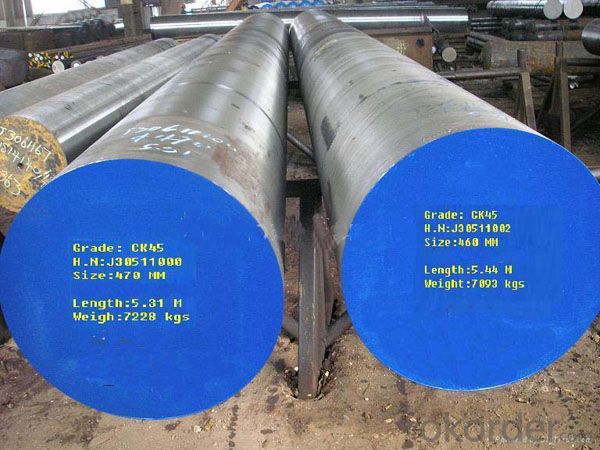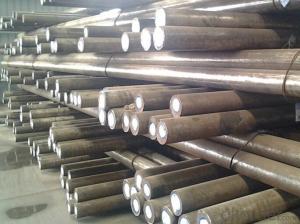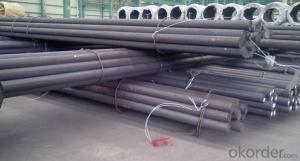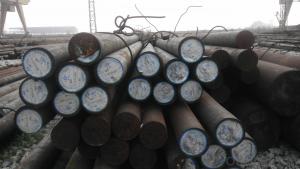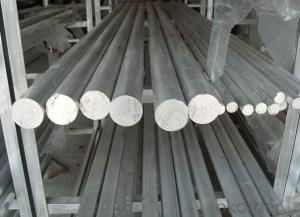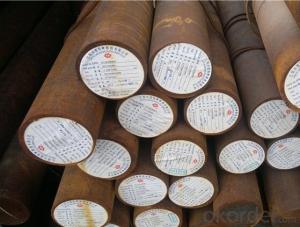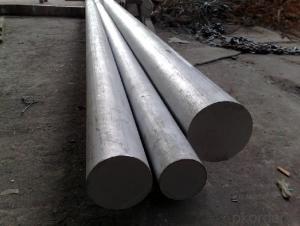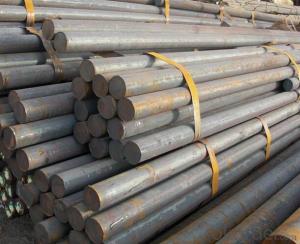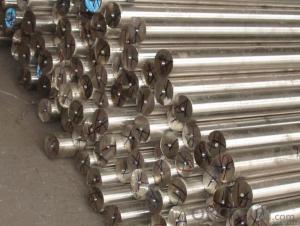Alloy Steel ASTM 6G Special Steel Tool Steel
- Loading Port:
- China main port
- Payment Terms:
- TT OR LC
- Min Order Qty:
- 25 m.t.
- Supply Capability:
- 10000 m.t./month
OKorder Service Pledge
OKorder Financial Service
You Might Also Like
Specification
Chemical Composition(GB)%
| C | Si | Mn | P | S | Cr | Mo |
| 0.50-0.60 | 0.25-0.60 | 1.20-1.60 | ≤0.030 | ≤0.030 | 0.6-0.9 | 0.15-0.30 |
Standard
| GB | JIS | AISI | DIN |
| 5CrMnMo | SKT3 | 6G | 1.2311 |
Heat Treatment
| Item | Temperature ℃ | Hardness |
| Anneal | 760-780 | 197-241HB |
| Quenching | 820-850 | 52-58HRC |
| Tempering | 490-510 | 41-47HRC |
| 520-540 | 38-41HRC |
Characterstics:common hammering forging die steel
Applications:Suitable for various forging dies with higher strength and abrasion resistance
2 steel


1, Your advantages?
professional products inquiry, products knowledge train (for agents), smooth goods delivery, excellent customer solution proposale
2, Test & Certificate?
SGS test is available, customer inspection before shipping is welcome, third party inspection is no problem
3, Payment Terms?
30% TT as deposit and 70% before delivery.
Irrevocable L/C at sight.
4, Trading Terms?
EXW, FOB, CIF, FFR, CNF
6, After-sale Service?
We provides the services and support you need for every step of our cooperation. We're the business partner you can trust.
For any problem, please kindly contact us at any your convenient time.
We'll reply you in our first priority within 24 hours.
- Q: How does special steel contribute to reducing product costs while maintaining quality?
- Special steel contributes to reducing product costs while maintaining quality through various ways. Firstly, special steel offers higher strength and durability, allowing manufacturers to create lighter and more efficient designs. This reduces material usage and transportation costs while maintaining the desired product performance. Additionally, special steel's exceptional corrosion resistance minimizes the need for expensive protective coatings or frequent maintenance, saving on long-term costs. Its superior heat resistance also enables manufacturers to use less energy during production processes, resulting in reduced operational expenses. Furthermore, special steel's unique properties, such as high machinability and formability, enhance manufacturing efficiency. This leads to reduced production time, lower labor costs, and increased overall productivity. Overall, the use of special steel in product manufacturing optimizes cost-efficiency without compromising quality, making it an indispensable material for many industries.
- Q: What are the main applications of special steel in the medical implants?
- Special steel is widely used in medical implants due to its unique properties and high biocompatibility. It is primarily used in applications such as orthopedic implants, cardiovascular devices, dental implants, and surgical instruments. The excellent strength, corrosion resistance, and ability to withstand sterilization processes make special steel ideal for these applications, ensuring long-term durability and patient safety. Additionally, the versatility of special steel allows for the production of complex implant designs, promoting better integration with the patient's body and enhancing overall implant performance.
- Q: How does spring steel maintain its elasticity?
- Spring steel maintains its elasticity due to its unique composition and manufacturing process. It is made from a high carbon steel alloy that undergoes heat treatment and quenching, which gives it its exceptional strength and flexibility. This heat treatment process called tempering allows the steel to retain its shape and bounce back to its original form after being deformed or subjected to external forces. The carbon content in spring steel also contributes to its elasticity by providing increased hardness and resistance to deformation. Overall, the combination of high carbon content, heat treatment, and quenching make spring steel highly durable and able to maintain its elasticity over extended periods of use.
- Q: How is the tensile strength of special steel measured?
- The tensile strength of special steel is typically measured using a standardized test called a tensile test. In this test, a sample of the steel is subjected to controlled tensile forces until it reaches its breaking point. The amount of force required to break the sample is then recorded as the tensile strength of the steel.
- Q: Can special steel be used for jewelry?
- Yes, special steel can be used for jewelry. Special steel, such as stainless steel or titanium, is often used in jewelry making due to its durability, resistance to tarnish, and hypoallergenic properties. It is commonly used for crafting earrings, necklaces, bracelets, and rings, providing a sleek and contemporary look for those who prefer an alternative to traditional precious metals.
- Q: What are the requirements for special steel used in transportation infrastructure?
- The requirements for special steel used in transportation infrastructure include high strength and durability, resistance to corrosion and fatigue, excellent weldability, and the ability to withstand extreme temperatures and environmental conditions. Additionally, it should meet specific standards set by regulatory bodies to ensure its safety and reliability in supporting and maintaining transportation structures such as bridges, railways, and highways.
- Q: How does special steel contribute to improving product efficiency in energy-intensive processes?
- Special steel plays a crucial role in improving product efficiency in energy-intensive processes due to its unique properties. Its superior strength, durability, and heat resistance allow for the design and manufacturing of more efficient and high-performing equipment. By using special steel components, energy-intensive processes can operate at higher temperatures, withstand harsh conditions, and reduce material wear, resulting in increased productivity, reduced downtime, and ultimately, improved energy efficiency.
- Q: How is special steel graded?
- Special steel is graded based on various factors such as chemical composition, mechanical properties, and the intended application. It typically involves assessing the steel's alloying elements, heat treatment processes, and quality control measures to determine its grade and suitability for specific industrial purposes.
- Q: Can special steel be used in the marine industry?
- Yes, special steel can be used in the marine industry. Special steels such as stainless steel or corrosion-resistant alloys are commonly used in the marine industry due to their high strength, durability, and resistance to corrosion in harsh marine environments. These materials are utilized for various applications including shipbuilding, offshore structures, and marine equipment to ensure long-lasting performance and safety at sea.
- Q: What are the requirements for special steel used in wind turbines?
- The requirements for special steel used in wind turbines typically include high strength and durability, resistance to corrosion and fatigue, excellent weldability, and good magnetic properties. Additionally, the steel should possess good formability and machinability to aid in the manufacturing process of turbine components.
Send your message to us
Alloy Steel ASTM 6G Special Steel Tool Steel
- Loading Port:
- China main port
- Payment Terms:
- TT OR LC
- Min Order Qty:
- 25 m.t.
- Supply Capability:
- 10000 m.t./month
OKorder Service Pledge
OKorder Financial Service
Similar products
Hot products
Hot Searches
Related keywords
